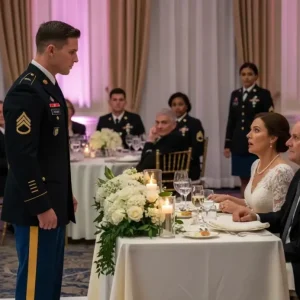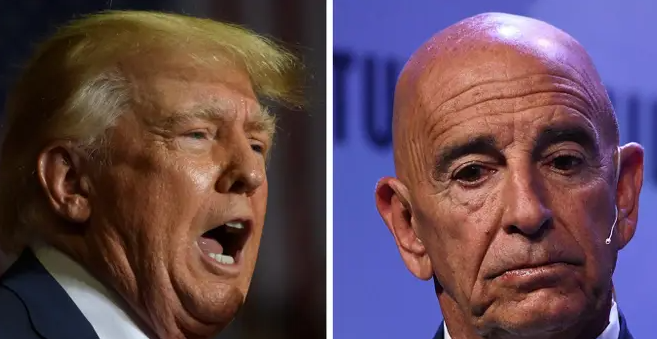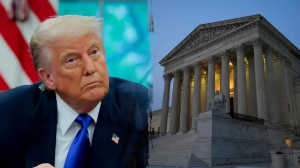On April 29, 2025, the U.S. Senate approved President Donald Trump’s nominations of three wealthy businessmen—Warren Stephens, Thomas “Tom” Barrack Jr., and Tilman Fertitta—as ambassadors to the United Kingdom, Turkey, and Italy, respectively. All three men, prominent GOP donors, reflect Trump’s continuing practice of appointing political allies and financial backers to top diplomatic posts. Despite some partisan resistance, each nominee won confirmation by a comfortable margin, reflecting a degree of bipartisan cooperation even amid ongoing political division. Their appointments come as President Trump’s approval ratings continue to climb, bolstered by his aggressive trade agenda. The new ambassadors face high-stakes diplomatic challenges across Europe and the Middle East.
1. Warren Stephens: U.S. Ambassador to the United Kingdom and Northern Ireland
1.1 Confirmation and Professional Background
Stephens was confirmed by a 59–39 Senate vote. He has helmed Stephens Inc., a major privately-owned investment bank based in Arkansas, since 1986. Under his leadership, the firm has grown into a financial powerhouse.
1.2 Political Shifts and Donations
Stephens’s political trajectory is notable: in 2016, he donated $1 million to a PAC opposing Trump. But by 2024, he had donated $3 million to the pro-Trump MAGA Inc., signaling a dramatic pivot in allegiance.
1.3 Diplomatic Timing
His arrival in London comes as Prime Minister Keir Starmer works to reorient the UK’s post-Brexit trade relations and seeks a fresh U.S. trade pact. Stephens will also have to manage issues around the Good Friday Agreement in Northern Ireland and the lead-up to a potentially pivotal UK general election.
2. Thomas “Tom” Barrack Jr.: U.S. Ambassador to Turkey
2.1 Senate Vote and Business Credentials
Barrack was confirmed by a 60–36 vote. A longtime real estate investor, he founded Colony Capital and served as an informal adviser to multiple Republican presidents, including leading Trump’s 2017 inauguration committee.
2.2 Legal Controversy and Acquittal
In 2021, Barrack was indicted on charges of lobbying on behalf of the UAE without registering as a foreign agent. He was acquitted in 2022, a verdict that helped rehabilitate his reputation in both business and political circles.
2.3 Strategic Stakes in Ankara
Turkey presents a thorny diplomatic landscape: balancing its NATO membership with closer military ties to Russia, clashing policies in Syria, and domestic human rights concerns. Barrack must navigate these tensions while advancing counterterrorism coordination and regional stability.
3. Tilman Fertitta: U.S. Ambassador to Italy and San Marino
3.1 Bipartisan Backing
Fertitta received the strongest confirmation vote of the three, with the Senate approving his nomination 83–14. He leads Landry’s, Inc., a hospitality empire including restaurants, hotels, and casinos, and owns the NBA’s Houston Rockets.
3.2 Business Track Record and Civic Engagement
Fertitta is known for growing brands like Morton’s and Rainforest Café and providing employment to tens of thousands across the U.S. He has also served on the University of Houston’s Board of Regents and is a major donor to charitable efforts in Texas.
3.3 Italian Political and Economic Challenges
Italy is facing economic uncertainty and political instability under Prime Minister Giorgia Meloni, as well as significant pressure from immigration and EU sanctions on Russia. Fertitta’s task will be to foster stronger U.S.-Italy business ties and help steer collaborative initiatives on trade, defense, and cultural exchange.
4. Ambassadorships and the Patronage Debate
4.1 The Tradition of Political Appointees
Presidents from both parties have a long history of rewarding donors with diplomatic posts—especially in stable allied countries. Critics argue this practice favors wealth over diplomatic expertise, sidelining career Foreign Service officers.
4.2 Supporters Cite Private-Sector Strengths
Defenders argue that prominent business leaders offer valuable skills in negotiation, leadership, and global networking. Fertitta’s hospitality experience, Stephens’s financial background, and Barrack’s Middle East savvy are presented as assets in key U.S. partnerships.
5. Trump’s Rising Popularity Amid Controversial Trade Moves
5.1 Polling Momentum
According to a mid-April J.L. Partners poll, Trump’s approval rating rose to 53%, up from 49% the previous week.
5.2 Demographic Gains
Trump’s support grew across several key voter groups:
-
Ages 18–29: +13 points
-
Black voters: +17 points
-
Democrats/Independents: +6 points
5.3 Tariff Policy Impact
These gains followed Trump’s announcement of new tariffs on imports from China, Canada, Mexico, and the EU. While free-trade conservatives voiced concern, the move appears to resonate with working-class and nationalist voters.
6. Foreign Policy Goals and Diplomatic Outlook
6.1 Strengthening Ties with the UK
Ambassador Stephens is expected to prioritize a U.S.-UK trade agreement, reinforce intelligence cooperation, and push for collaboration in tech and environmental initiatives—while navigating shifting political winds in Westminster.
6.2 Managing U.S.-Turkey Frictions
Barrack will confront Turkish-Russian defense alignments, tensions over Kurdish militias, and counterterrorism partnerships. His mission: maintain a functioning alliance with Ankara while safeguarding core U.S. interests.
6.3 Building Economic Bridges with Italy
Fertitta will focus on promoting American investment, supporting Italy’s role in enforcing EU sanctions on Russia, and boosting tourism and cultural ties between the two nations.
7. Senate Votes Reflect Bipartisanship in Foreign Policy
7.1 Confirmation Trends
Fertitta’s overwhelming approval shows that diplomacy can still draw bipartisan consensus. While Stephens and Barrack had more divided votes, both received enough cross-party support to illustrate continued cooperation in key foreign policy roles.
7.2 Future Scrutiny
Despite confirmation, the Senate Foreign Relations Committee is likely to revisit the issue of politically appointed ambassadors, weighing donor influence against long-term diplomatic impact.
8. Historical Context and Trump’s Staffing Strategy
8.1 Diplomatic Appointments Over Time
From Hoover to Clinton, past presidents have filled high-profile ambassador posts with major donors, particularly in Western Europe. Career diplomats typically receive tougher or more volatile assignments.
8.2 Lessons from Trump’s First Term
Trump’s early administration was marked by delays in staffing key roles. This round of confirmations signals a more proactive second-term strategy to secure loyalists for major diplomatic positions.
9. What This Means for U.S. Global Influence
9.1 Balancing Business Savvy and Diplomatic Depth
While business leaders bring commercial strengths, diplomacy also demands deep cultural knowledge, local expertise, and fluency in international law—qualities cultivated over decades in the Foreign Service.
9.2 The Broader Message to Allies
These appointments send a clear signal: the Trump administration favors personal loyalty and deal-making capabilities. Allies may welcome closer economic ties but will be watching for signs that the U.S. remains professionally grounded in diplomacy.
Conclusion
With the confirmations of Warren Stephens, Tom Barrack, and Tilman Fertitta, the Trump administration has reaffirmed its approach of blending political loyalty with business clout in diplomatic appointments. As these ambassadors begin their tenures in London, Ankara, and Rome, they will face demanding tests that could redefine the role of private-sector leaders in global statecraft. At the same time, Trump’s rising domestic approval suggests his political base is embracing this approach—setting the tone for his second term’s foreign policy agenda.









